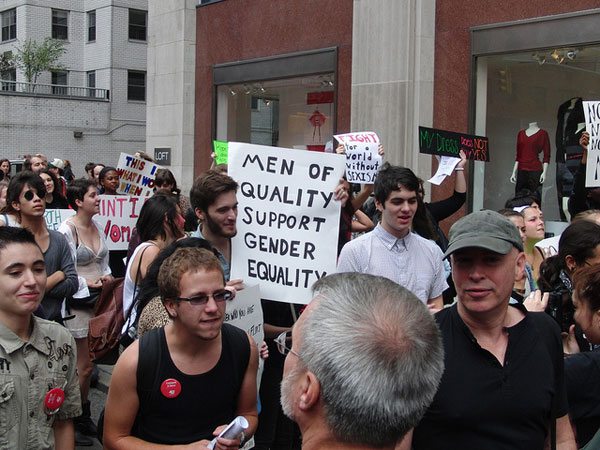
October 11, 2017; Pioneers Post
In the United States, we often like to rate the human rights practices of others, but we too rarely consider how others view our own human rights practices. This week, though, the British Council released a report, covered by the British publication Pioneers Post, that aims to assess “how well social enterprise is addressing gender inequality and women’s empowerment in the US.”
The report, done in cooperation with the US-based Social Enterprise Alliance, is titled “From an Activist to Entrepreneur: The role of social enterprise in supporting women’s empowerment in the US,” and is meant to be the first in a series of country studies. For those of us in the United States, the study, although modest in length, provides a valuable outsider’s eye regarding the state of our social enterprise field.
Sometimes though, having an outsider’s eye can be jarring. For example, did you know that the US ranks 43rd of 44 countries in a 2016 survey by the Thomson Reuters Foundation regarding countries where “women fared best when taking into account representation in leadership roles in social enterprises and the gender pay gap?”
The report also highlights other areas where the United States falls short of the gender equality achievements of others. For example, in 10 countries women start businesses as frequently as men. These countries include Canada and Australia, but not the United States. The report goes on to cite other statistics that speak to continued gender disparities in the United States, including the small percentage of Fortune 500 companies headed by women (4 percent), as well as the high risk of sexual violence that women face; the report cites the figure of “1 in 5 risk” of women facing sexual assault, a figure also found in a Centers for Disease Control study released three years ago. In short, while we may be aware of this fact, the data confirm that the United States is something less than a world leader when it comes to gender equality.
The main focus of the report, of course, centers on social enterprise. The authors assert that, despite some shortcomings, overall social enterprise plays “a small but growing part of the struggle for greater social justice in the US.” The goal of the study, says Melissa Wear, the head of society programs for the British Council USA, is to provide “recommendations for the social enterprise, funder/investment and government sectors to ensure that the future of the social enterprise sector will be a place where today’s girls can become tomorrow’s leaders.”
As the Pioneers Post outlines, the report finds some important areas where social enterprise is making a positive difference. For example, the article notes that “while women make up only 46 per cent of the total US workforce, they comprise 65 per cent of the social enterprise workforce.” Women also more likely to form social enterprises. The report authors add that, “When it comes to for-profit entrepreneurship in the US, only one business in three is started by a woman… By contrast, the gender gap in social entrepreneurship is reversed, with 55 per cent of social enterprises started by women.”
Sign up for our free newsletters
Subscribe to NPQ's newsletters to have our top stories delivered directly to your inbox.
By signing up, you agree to our privacy policy and terms of use, and to receive messages from NPQ and our partners.
The report also discusses some leading examples of US social enterprise:
Black Girls Code, for example, aim[s] to increase the number of women of color in the tech sector, where they are severely underrepresented. MADE by DWC (Downtown Women’s Centre) is a social enterprise in Los Angeles dedicated to empowering homeless and low-income women to overcome barriers to employment. Peninsula Children’s Learning Centre provide high quality, affordable childcare and education as well as family support programs in Portland. And Beyond Care Childcare Cooperative in Brooklyn provides good quality, living wage jobs for women from poor, immigrant communities.
The report also includes a brief case study of the Denver-based Women’s Bean Project, “a social enterprise providing employment and training opportunities for women recovering from addiction.”
Women interviewed for the study cite a number of benefits that they have gained from social enterprise. For instance, 53 percent said that “starting a social enterprise had given them an increased sense of self-worth.” Additionally, 51 percent reported that their social enterprise participation had led to increased confidence, 38 percent said that it had made them more able to make their own choices, and 55 percent listed becoming part of a network as a positive outcome.
At the same time, the report also found that “75 percent of female social entrepreneurs reported experiencing some negative impact,” much of it centered around financial instability and stress. Another two-edged sword: While it is good that women are gaining employment at a higher rate in social enterprise than in the general economy, the high female presence in the sector is also in part reflective of “the fact that many [women] are disadvantaged in the labor market.”
The report ends with a series of recommendations for practitioners and intermediaries, foundations, and government.
- For practitioners and intermediaries, these include setting up “an advisory panel for women, minorities and under-represented groups to engage governments, funders and other stakeholders in the barriers facing these groups in social enterprise” and fostering more “social enterprises that focus on women’s empowerment through campaigns, accelerator programs, competitions and funding that specifically encourage gender-focused ventures,” as well as the adoption of progressive labor policies (e.g., parental leave) and support for peer networks.
- For funders, recommendations include employing “both a ‘gender lens’ and a ‘racial lens’ when making investment decisions” as well as a host of other recommendations, including fostering greater board gender balance and racial diversity, the subject of a current NPQ-BoardSource webinar series.
- For government, the recommendations include a call for publishing a white paper that would highlight “the benefits and the social impact of women-owned businesses and accurately map the numbers and types of social enterprises in this space.”
In response to the report, US Social Enterprise Alliance CEO Kila Englebrook says her organization “will take an active role in disseminating the findings as well as moving forward some of the recommendations.” Englebrook adds that she is “excited that this report plays into a narrative that is very present right now. Women’s equality is an issue that’s not been put to bed. The report will put us on a path to make that change. It’s a positive moment for this to happen.”—Steve Dubb











